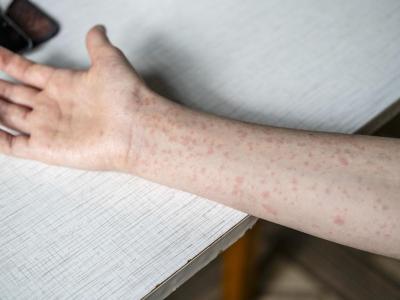A United Arab Emirates (UAE) man who owns camels is sick with a Middle East respiratory syndrome coronavirus (MERS-CoV) infection, the World Health Organization (WHO) announced today.
The patient is a 68-year-old Abu Dhabi resident who fell ill on Mar 1 and has been hospitalized since Mar 3, the WHO said in a statement. He is in stable condition.
"He had no contact with other known MERS-CoV cases and had no travel history," the agency said. "The patient owns a farm that he visits daily, and where he had contact with animals, including camels which he breeds."
Middle Eastern dromedary camels are known to harbor MERS-CoV and are a suspected source of human infections, though the link has not been firmly established. Several other cases have involved exposure to camels, but many patients have not reported any contact with the animals.
Including the new case, 16 MERS cases have been reported in the UAE, according to a tally maintained by FluTrackers, an online infectious disease message board.
In the same statement today, the WHO recognized two MERS cases reported previously by Saudi Arabia, though the details of one of them did not fully match up with what Saudi officials reported on the date mentioned by the WHO.
The WHO said the cases involved a 51-year-old man and a 56-year-old woman, both from Riyadh and both having underlying medical conditions. The man, who was exposed to animals before his illness, got sick on Feb 28 and was hospitalized Mar 2. The woman fell ill on Feb 17, was hospitalized Feb 25, and died on Mar 3, the agency said.
The WHO said the two cases were reported by the Saudi Ministry of Health (MOH) on Mar 5. The Mar 5 MOH statement matches the WHO announcement concerning the 51-year-old man, except that it doesn't mention exposure to animals. But the MOH described the other patient as a 55-year-old man rather than a 56-year-old woman.
However, on Feb 26 the MOH did report a case in a 56-year-old Riyadh woman, who was said to be in an intensive care unit. Subsequent MOH statements have not mentioned her death.
With the new UAE case and the two Saudi cases, the WHO's MERS count has reached 189 cases with 82 deaths. The WHO has not yet noted a case announced by Saudi Arabia on Mar 6, involving an 86-year-old Riyadh man who had no symptoms. The Saudi MOH count stands at 151 cases and 62 deaths.
No MERS-CoV in 5,000 Hajj participants
In other developments, no evidence of MERS-CoV was found in a sample of more than 5,000 participants in the 2013 Hajj, according to Saudi Arabian researchers.
The annual pilgrimage, which drew more than a million foreign visitors to Saudi Arabia last October, had sparked concern about the risk of spreading MERS-CoV to more countries. But no confirmed cases have been reported in Hajj attendees. Two probable cases were reported in pilgrims from Spain, but they were never confirmed.
Writing in the Journal of Infectious Diseases, the scientists said they collected nasopharyngeal samples from 5,235 pilgrims from 22 countries and used reverse-transcriptase polymerase chain reaction to test them for MERS-CoV. No positive samples were found.
The researchers also collected information about the travelers' vaccination history to assess their compliance with Saudi Arabia's immunization recommendations.
They learned that all participants had received meningococcal vaccines and most of those from at-risk countries had been vaccinated against yellow fever and polio. But only 22% of the pilgrims, including 17.5% of those 65 or older and 36.3% of diabetics, had received flu vaccine, and 4.4% had had pneumococcal vaccination.
See also:
Mar 12 WHO statement
FluTrackers list of MERS cases
Mar 11 J Infect Dis report
Related Feb 10 CIDRAP News item on MERS and the Hajj
Saudi MOH MERS-CoV page with case count





















